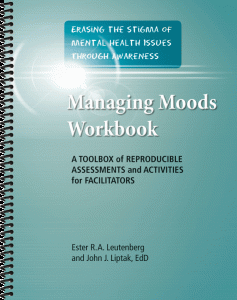Mental Health Awareness
Excerpted from Managing Moods Workbook, by Ester R.A. Leutenberg and John Liptak, PhD
 May is Mental Health Awareness Month. It is important that facilitators keep an open mind about mental health issues and the stigma attached to people experiencing these issues. Rather than thinking of people as having a mental disorder or being mentally ill, Erasing the Stigma of Mental Health Issues through Awareness helps facilitators to diminish the stigma that surrounds people suffering from these issues. Stigmas occur when people are unduly labeled, which sets the stage for discrimination and humiliation.
May is Mental Health Awareness Month. It is important that facilitators keep an open mind about mental health issues and the stigma attached to people experiencing these issues. Rather than thinking of people as having a mental disorder or being mentally ill, Erasing the Stigma of Mental Health Issues through Awareness helps facilitators to diminish the stigma that surrounds people suffering from these issues. Stigmas occur when people are unduly labeled, which sets the stage for discrimination and humiliation.
People who stigmatize and /or stereotype others bring about unfair treatment. This unfair treatment can be very obvious. For example, people make negative comments or laugh. On the other hand, this unfair treatment can be very subtle. For example, people assume that a person with mental health issues is dangerous or violent.
Stigmas affect a large percentage of people throughout the world. Some of the more common stigmas are associated with physical disabilities, mental health conditions, age, body type, gender, sexual orientation, nationality, family, ethnicity, race, religion, financial status, social sub-cultures and conduct. Stigmas set people apart from society and produce feelings of shame and isolation. People who are stigmatized are often considered socially unacceptable and they suffer prejudice, rejection, avoidance and discrimination.
Mental Health Awareness – An Introduction to Stigmas for your Clients
A stigma is extreme social disapproval of some type of personal characteristic or a belief that is not considered socially acceptable. Fear of judgment and ridicule about mental illness often compels individuals and their families to hide away from society rather than face criticism, shunning, labeling and stereotyping. Instead of seeking treatment, they struggle in silence. Here are some ways you can combat the stereotypes and stigmas that are associated with mental illness.
- You and your loved ones have choices. You can decide who is to know about your mental illness and what to tell them. You need not feel ashamed or embarrassed.
- You are not alone. Remember that many other people are coping with a similar situation.
- Seek help and remember that treatment from medical professionals can help you to have productive careers and live satisfying lives.
- Be proactive and surround yourself with supportive people – people you can trust. Social isolation is a negative side effect of the stigma linked to mental illness. Isolating yourself and discontinuing enjoyable activities will not help.
Mental Health Awareness Month – Printable Exercises
- Click here for a printable version of the Introduction to Stigmas for your Clients.
- Click here for a worksheet to help folks de-stigmatize view of mental health issues.
- Click here for a journaling worksheet.
DE-STIGMA-TIZE with the Facts About Mental Health Issues
Myth: Mental health issues are rare.
Fact: Mental health issues are not rare and affect nearly everyone either directly or indirectly.
Myth: People with mental health issues are unable to lead productive lives.
Fact: Most people with a mental health issue respond to treatment, learn to cope with and manage their problems, and go on to lead productive and fulfilling lives.
Myth: People who have mental health conditions will not get better.
Fact: Once diagnosed, mental health issues are treatable. While they are not always cured, they can be managed effectively. Most people with mental health conditions live productive and positive lives while receiving treatments for their mental health issues. As is the case with any illness, individuals with severe or persistent mental health conditions who respond poorly to available treatments may require more support and may not function as highly as others.
Myth: People with serious mental health issues are violent and unpredictable.
Fact: While some people who suffer from serious mental health issues do commit antisocial acts, mental health issues do not equal criminality or violence – despite the media’s tendency to emphasize a suspected link. People with mental health issues are no more likely to commit violence than anyone in the general public, but they are more likely to be victimized and are more likely to inflict violent behaviors on themselves.
Myth: Mental health issues happen because of bad parenting or personal weakness.
Fact: The main risk factors for mental health issues are not bad parenting or personal weakness but rather genetics, severe and prolonged stress (such as physical or sexual abuse), or other environmental influences (such as birth trauma or head injury).
Myth: Treatments for mental health issues are not usually effective.
Fact: The effectiveness of any treatment depends on a number of factors including the type of mental health issue and the particular needs of the individual. A combination of psychiatric medication and psychotherapy, or social interventions is the most effective way to treat mental health issues.
Myth: Mental health conditions are caused by everyday stressors.
Fact: It may seem that stress is responsible for mental health conditions; however, there is no one clear cause of mental health issues. Rather, it is a result of complex interactions between psychological, biological, genetic, and social factors. Stress, stigma, and lack of support can make it worse on the individual.
Myth: Mental health issues are always hereditary.
Fact: Some mental health issues include a genetic component, which results in a predisposition or vulnerability toward the mental health problems among children and siblings, but environment also plays a key role in the development of certain conditions. If someone in one’s family has a mental health condition, that person will be a higher risk.
